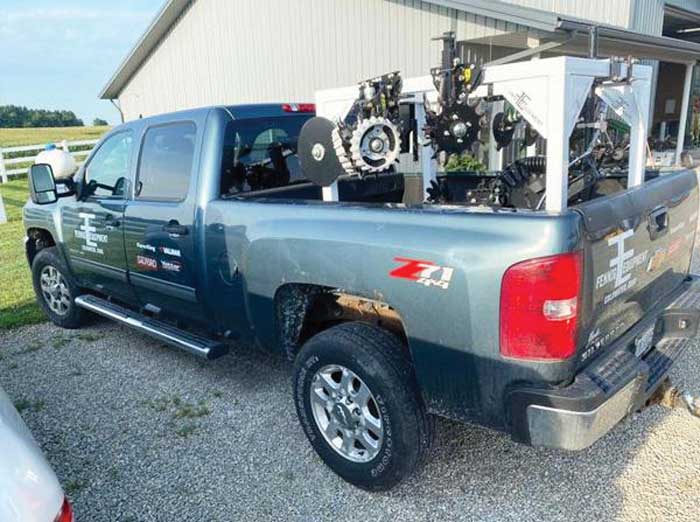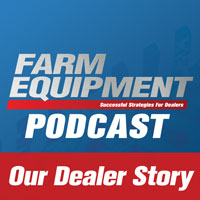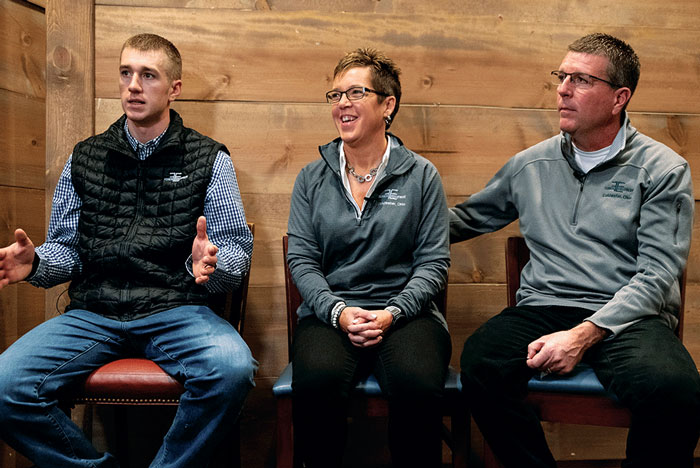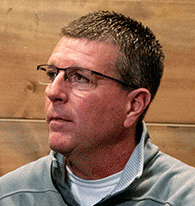After 21 years working as a parts manager for an AGCO dealership, Gary Fennig left the dealership to go help with the family’s crop insurance business. But he didn’t stay away from selling equipment long, starting Fennig Equipment along with brothers Mike, Todd and Ryan, just a year later in 2011. Ten years later, what started off with selling a pallet of twine to a farmer has turned into a successful shortline dealership that carries 10 different lines, including the Fe4R Highboy Application System, which Fennig manufactures.
Today, Fennig’s wife, Angie, son, Adam and Mike’s son-in-law Kyle Schmitz, are involved in the business as well. As the dealership has grown, Gary’s role has changed as well. “The hardest part for me, personally, is just the growth that we’ve had over the last 8-10 years since we started this business,” Fennig says. “The growth has been spectacular and we’re just along for the ride to see where we end up. You just have to have the right people with you on the journey.”
When it comes to what sets them apart, Adam Fennig says, “We offer some different equipment, but anyone can offer that. But what’s different is we run on our agenda. We don’t have someone telling us what to push. We get to talk to hundreds of farmers a week and by having that nose to the ground, we get to hear what the farmers are telling us and we adjust to that.”
Fennig reiterates his son’s point, saying the organization is very nimble and savvy. The dealership’s mission is to “assist farmers in maximizing crop yield by providing solutions to fit their operation.” That nimbleness and solution-minded attitude means the Fennig Equipment team can work with the customers to get them what they’re looking for.
Fennig Equipment
Locations: 2 – Coldwater, Ohio and Nowalk, Ohio
Founded: 2011
Owners: Gary, Mike, Todd and Ryan Fennig
Employees: 19
Shortlines: 360 Yield Center, Copperhead Ag, Enduraplas, Farm King, Fe4R by Fennig Equipment, J&M, Martin-Till, Salford, TruAg and Yetter Farm Equipment
“We’re not a ‘straight line’ dealer as far as things being black and white, it’s either this way or it’s not,” he says. “If something won’t work a certain way, we can change. We can change throughout the process of the selling period if the customer wants to adapt to something different. We can do that pretty easily.”
Selling Shortlines
Fennig got its start as a farm equipment dealer selling Yetter Farm Equipment, which was followed by Salford. When it comes to deciding what — if any — brands or lines to add, Fennig says it’s largely based on customer demand. Fennig says if customers express interest in the dealership carrying a specific product, they will generally give it a shot.
For example, when Fennig Equipment recently added Martin-Till to its product offerings, it was a direct result of customers calling up and looking for Martin equipment. After years of sending customers who called looking for Martin elsewhere, Fennig decided it was time to add the line despite selling a competitive product.
He says they also look at what the competition from other dealers in the area look like. But, there being a competitive dealer nearby isn’t a non-starter. “There’s a Yetter dealer at every corner in town, but I think the way we structure things, the way we handle the customers, it seems like they’re always coming back the second, third, fourth time for repeat business,” he says.
Because shortlines are Fennig Equipment’s bread and butter, the lines the dealership sells are its first choice, Fennig says. “Mainline dealers, they have their main line to deal with and then shortlines are their second choice. But shortlines are our first choice, our only choice. My sales team knows the shortlines like the back of their hand,” he says.

Fennig Equipment uses this truck bed display to bring products and ideas to a customer to help them visualize the products and ideas.
“It seems like every farmer, whether in bad economic times or good economic times, is always updating or switching equipment, doing something. That’s where we’ve come into play. With the shortline side of things, we can assist them with decisions on outfitting that planter or putting a cover crop seeder here; we’re a good niche, filling that void that a lot of other dealers don’t.”
Communicating & Educating
Whether through its newsletter or YouTube channel, Fennig Equipment is regularly communicating and educating both its customers and potential customers. Much of that work is thanks to Adam Fennig. From product walk-arounds, to assembly how-to’s and dealership updates, Fennig’s YouTube Channel has nearly 1,000 subscribers and nearly over 500,000 views.
“The videos are very helpful for us and the customer. If you’re talking to a customer about a piece of equipment, you can always send them a link to a video. It definitely helps answer the questions the customer is going to have,” Fennig says.

“We offer some different equipment, but anyone can offer that. But what’s different is we run on our agenda. We don’t have someone telling us what to push. We get to talk to hundreds of farmers a week and by having that nose to the ground, we get to hear what the farmers are telling us and we adjust to that…” – Adam Fennig
Farmers love watching videos of machinery and seeing what other farmers are doing, says Adam Fennig. “The internet is a huge part of what we’ve done, whether it’s from TractorHouse, Facebook, YouTube. Tying all that stuff together, it’s been amazing,” he says. “There’s no secret behind what I’m doing or what we do with marketing. We just try to film the insides of what we do. We try to be as transparent with the farmer as possible about what we’re working on this in the shop. We want every farmer in America to see it.”
The dedication to filming videos and sharing them — Fennig’s weekly newsletter includes a “New YouTube Videos This Week” section — has helped establish the dealership as product experts, Adam Fennig says.
Beyond educating customers though, Fennig credits the videos that Adam pushes out via YouTube and the dealership’s newsletter with helping close sales.
“It seems like when we go to farm shows and get out to different events, there’s always farmers who come up to us and say, ‘Hey, I saw this video, where is this piece at?’ Seems like it makes a full circle. We start with a little video, but at the end of the day, the full circle is when I get their check. They definitely pay off as far as how we do things here.”

Our Dealer Story Podcast
Hear more from Gary, Angie and Adam Fennig in Farm Equipment’s Our Dealer Story Podcast interview. The three share the origin of how the dealership evolved from that initial pallet of twine and what their vision for the future is.

Beyond videos and newsletters, the dealership also uses field demos, open houses and webinars to help educate customers about the products Fennig Equipment sells for cover crops, strip-tilling and nutrient placement.
Monitoring the Market
In terms of keeping the pulse of the dealership, gross profit is a driving metric for Fennig, and he holds weekly sales meeting with all the employees. In addition to keeping an eye on his own business, he says he also closely watches the grain markets. The dealership is tuned into what’s happening on a more micro level, as well.
“My sales team is known for pulling into the farmer’s driveway. I call my sales guys and say, ‘Hey, what’s going on?’ And, they know what’s going on because they’re talking to the farmer every day.
“They can give me that feedback, and that lets me know if we ought to be ordering a few more of this or hold back on ordering this because of the personal contact we have with the farmer,” Fennig says.
Nearly all Fennig Equipment employees farm as well, which Fennig says helps the team and its customers identify with each other better. And, it helps them understand the dealership’s business better.

In the spring of 2021, Fennig Equipment expanded its equipment lot to make room for additional inventory. Co-owner Gary Fennig says unlike many dealers, they have not struggled with inventory this year, which he credits to regular — often daily — conversations with the dealership’s various territory reps, particularly their Yetter and Salford reps.
“They know what we’re doing, they know what this all is about. When everybody’s rowing the boat in the same direction, it seems to row a lot easier,” he says.
Challenges & Opportunities
While supply chain issues are causing inventory problems across the farm equipment industry — and nearly all industries — Fennig says inventory hasn’t been a problem for the dealership. He credits that to having regular contact with his territory reps, particularly Jeff Wherley at Yetter and Dave Dunkelman at Salford.
“I am in contact with them daily and we have multiple conversation on ordering procedures — when we’re going to order to make sure we have this and that. That’s definitely helped,” he says. “I keep they abreast of what’s going on, and they also talk to a lot of dealers themselves and let me know what’s going on. With all that input, we put our heads together and decide what we want to do and we move forward.”

“Going into the fall and into 2022, if you’re going to be hitting your sales goals that you present to your sales team, you’ve got to have the inventory. If you don’t have the inventory, that lets the sales guys know that I’m not in the ballgame anymore…” – Gary Fennig
Fennig says they ordered their inventory early and ordered quite a bit more than they have in past years because that inventory is going to be needed on the lot to reach sales goals.
“Going into the fall and into 2022, if you’re going to be hitting your sales goals that you present to your sales team, you’ve got to have the inventory. If you don’t have the inventory, that lets the sales guys know that I’m not in the ballgame anymore,” he says.
Looking ahead, Fennig says the challenge for the end of 2021 and into 2022 will be getting the product to the end user. He clarifies that it won’t be an issue of getting equipment from their vendors, but rather getting it out to their customers once they have it on hand because their staff is small.

In Fennig Equipment’s newsletter in mid-April of 2021 (see left) the dealership took the opportunity to prepare their customers for upcoming equipment and parts shortages. With spring just getting started — and snow still on the ground in Ohio at the time — Fennig encouraged customers to start ordering equipment for 2022.
“We have a lot of customers and I only have so many people, and it takes a little bit of time to get all that done. Next spring is going to be here before we know it. With planter purchases and so forth, it just seems like everything has just been a lot more hurried and rushed, especially with the grain markets at all-time highs,” he says.
Fennig Equipment started talking to customers as early as April 2021 about purchases for 2022, keeping potential inventory challenges in mind, and Fennig says he knows the sales team has regular conversations with their customers about it.
“But I don’t want my sales guys using that as a scare tactic either to the farmer. They have to take their time and decide on what they want to buy and when they want to buy it. And we have to have everything ready to go whenever they pull the trigger,” he says.
Growing as a Business
The business has been growing from day one and doesn’t show signs of slowing down. “The growth that we’ve been in over the last 8-10 years since we started this business has been spectacular, and we’re just along for the ride to see where we end up,” Fennig says.
“You’ve just got to have the right people with you on the journey, to make sure the I’s get dotted and T’s get crossed to make sure all the work gets done.”
“Having Adam and Kyle involved in the business and seeing it grow gives me a good feeling because I know that the legacy of Fennig Equipment is not going to just stop whenever we retire.”







